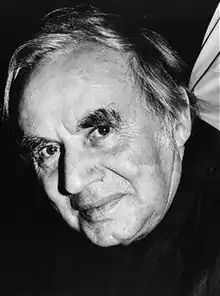Robert Jungk
Robert Jungk (German: [jʊŋk]; born Robert Baum, also known as Robert Baum-Jungk; 11 May 1913 – 14 July 1994) was an Austrian writer, journalist, historian and peace campaigner who wrote mostly on issues relating to nuclear weapons.[1]

Life
Jungk was born into a Jewish family in Berlin. His father, known as Max Jungk, was born David Baum (1872, Miskovice, Austria-Hungary – 1937, Prague, Czechoslovakia). When Adolf Hitler came to power, Jungk was arrested and released, moved to Paris, then back to Nazi Germany to work in a subversive press service. These activities forced him to move through various cities, such as Prague, Paris, and Zurich, during World War II. He continued journalism after the war.
His book, Brighter than a Thousand Suns: A Personal History of the Atomic Scientists, was the first published account of the Manhattan Project and the German atomic bomb project, and its first Danish edition included a passage which implied that the German project had been purposely dissuaded from developing a weapon by Werner Heisenberg and his associates (a claim strongly contested by Niels Bohr), and led to a series of questions over a 1941 meeting between Bohr and Heisenberg in Copenhagen, Denmark, which was later the basis for Michael Frayn's 1998 play, Copenhagen.
In 1986, he received the Right Livelihood Award for "struggling indefatigably on behalf of peace, sane alternatives for the future and ecological awareness."[2]
In 1992, he made an unsuccessful bid for the Austrian presidency on behalf of the Green Party.
Personal life
Robert Jungk married in 1948 Ruth Suschitzky (1913-1995),[3] and their son is journalist and writer Peter Stephan Jungk.[4]
Bibliography
- Tomorrow Is Already Here, New York: Simon & Schuster, 1954. Reportage on scientific and technical breakthroughs, a work of nascent dystopian 'futurism'. Much of it was about what developed from the Manhattan Project, as well as things like "electronic brains".
- Brighter than a Thousand Suns: A Personal History of the Atomic Scientists, New York: Harcourt Brace, 1958
- Children of the Ashes, 1st English ed. 1961. About Hiroshima
- The Nuclear State
- The Everyman Project
- Future Workshops
Decorations and awards
- 1970: Honorary Professor at the Technical University of Berlin
- 1986: Right Livelihood Award
- 1989: Honorary Citizen of the City of Salzburg
- 1992: Alternative Büchner Prize
- 1993: Honorary Doctor of the University of Osnabrück
- 1993: Austrian Cross of Honour for Science and Art
- 1993: Salzburg Award for Future Research
See also
- Alexander Sachs (Robert Jungk about the 1939 Szilard–Einstein letter to President Franklin Roosevelt)
Notes
- Calder, John (17 July 1994). "Obituary: Robert Jungk". The Independent. Retrieved 15 August 2021.
- "Robert Jungk". The Right Livelihood Award. Retrieved 8 January 2020.
- Robert Jungk – A Life Dedicated to the Future
- Peter Stephan Jungk
External links
- "Robert Jungk, futurist and social inventor"
- Works by Robert Jungk at Open Library
- Zukunftswerkstatt
- Robert Jungk & The New Encyclopedists (1978) revisited – a late eulogy at the 14th Anniversary of his death
- Works by or about Robert Jungk at Internet Archive